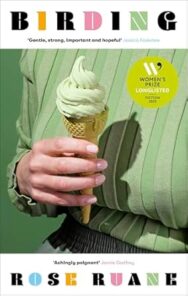‘Her photo ceases to symbolise hope, becoming content more than communication. And once again, she’s wondering what the fuck she is doing in this town.’
Birding is the second novel by Glasgow-based talent Rose Ruane. This dark and dreamy novel follows the lives of two forty-something women living in the same sleepy seaside town set on an unlikely collision course. Enjoy an excerpt here at BooksfromScotland below.
Birding
By Rose Ruane
Published by Corsair
Maybe it started eleven months ago, in the coffee shop, when Henry finally said sorry to Lydia. Maybe it started years previously, in poky flats and rented rooms where Henry did . . . well, whatever Henry did. When he inflicted whatever harms his abstruse, equivocating apology invited Lydia to absolve him of. Lydia still can’t fit a name to them. Maybe it started almost three decades before, on the day Lydia stood surrounded by pigeons in Leicester Square, hugging her best friend and bandmate Pandora, looking up at a reproduction of their album cover – a mugshot-style photo of them under the words The Lollies Are Legal, wearing nothing but knickers and cheesecake expressions and holding identity placards over their bare breasts – displayed on a billboard the size of a double-decker bus. Maybe it started the day that photo was taken, when Lydia and Pandora, all of nineteen, overheard the photographer telling the make-up artist to, ‘Get some slap on those eyebags; they’re meant to be jailbait and they look fucking ancient.’ Or when he sighed, lowered his camera, and told them to, ‘Lez it up a bit, look like you’re enjoying yourselves,’ and they did. Maybe it even started the first time no one said, ‘You don’t have to,’ or ‘It’s not your fault.’ Or maybe, it simply starts the day you’re born and all the becoming begins right then.
Lydia is contemplating this, staring at the statue which always looks to her like a drowning woman trying to catch the attention of a lifeguard, when a restive sparrow lands on the Come On In Girl’s gesturing hand. Lydia lifts her phone, zooms in, frames; catches the shot just as the tiny bird takes flight. She looks at the photo and is pleased. The dun fans of the bird’s wings are spread, scratchy wire feet not yet quite tucked, almost drawn into its body like the wheels of an ascending jet, the distance from bird to bronze in perfect golden ratio, a sliver of sky inside the gap. Look to the beauty: that’s Lydia’s mantra, though it’s becoming harder to heed and sounding hollower and more fragile every day. Increasingly, the world appears to her all shell: a Kinder egg containing no toy. But she knows if only she can force herself to dwell in the minute poetries and pathos of the everyday, then she can better bear the agony she’s been in for almost a year now. She posts the picture on Twitter and Insta, annotated with some trite but appealing observation about escape and freedom. The comments from her substantial number of followers begin to climb right away:
Love this Lydia *heart emoji* *bird emoji*
Great shot *camera emoji*
Gorgeous, needed this today, thank you x
*Trio of heart-eyed smiley emojis*
Pleasure sparks, falters and fades within seconds, like a cheap light-up novelty with spent batteries. Her photo ceases to symbolise hope, becoming content more than communication. And once again, she’s wondering what the fuck she is doing in this town. She’s been here nearly two months; an unplanned weekend break that slouched into a permanent state of temporariness. As if that couldn’t be said to describe her entire life up to the late August day when Pandora called out of the blue. Pandora was the last person Lydia had wanted to talk to, but some animal impulse to survive made her answer the phone. She had recognised it as her only chance. For days, death had been ranging round her head. She’d stopped imagining afterwards, stopped caring who might be sorry, wasn’t envisioning the uneasy collision of her parents and friends around her lily-topped coffin, had ceased compiling the soundtrack of exit songs. Lying by a sealed envelope without a name on it and a litre of vodka, Lydia simply wanted to unhappen and un-be. She imagined only the relief of thinking and feeling nothing after months suffocating in hell’s own Matryoshka of doubt, recursively dismantling and restacking the nested questions Henry had crammed into her head in that coffee shop months ago. But then the phone rang. Lydia knows she accepted the call and made a noise. Maybe she tried to say ‘Hi’ or ‘Pan’, but what came out was as much spasm as sound. She hardly remembers anything else. Just vivid, disjointed flashes: throwing clothes into a bag; the train pulling out of London through the suburbs as a low gold sun unravelled bolts of navy shadow across the pavements; thinking, It’s beginning to be autumn, and maybe I’ll feel the first cold day of it after all. But she does recall watching the city’s outermost edgelands spool by, the train’s fluorescent interior superimposed on the retail parks and playing fields, each abstracting the other, as an imagined cold elided with a remembered one. The brumous January morning, creeping towards a year ago, when Lydia walked into a coffee shop near London Bridge to meet Henry and walked out almost two hours later, feeling like a shell of the person who entered. So much easier to conjure the irrelevant details of the place: the way the seating was unabashedly designed to discourage lingering; the contrived, brittle friendliness of the barista that made Lydia feel more of a nuisance than if he’d been openly rude; the raucous laughter of a stranger – joyous while Lydia was waiting for Henry to arrive, violent as a plate being smashed by the time he’d embarked on his quibbling, self-interested monologue.
Birding by Rose Ruane is published by Corsair, priced £20.00.














